The abrupt announcement from former President Donald Trump regarding a sweeping 25% tariff on non-American-made vehicles has sent shockwaves throughout the automotive industry. This bold move, positioned as a patriotic endeavor to fortify American manufacturing, raises questions about its long-term implications for innovation and competition in an increasingly global marketplace. To grasp the breadth of this tariff’s potential impact, one must consider the complexities of automotive supply chains and the intricate web of international partnerships that sustain them.
By branding the tariffs as beneficial for U.S.-based automakers, Trump seems to overlook the fundamental realities of globalization. In modern manufacturing, reliance on international suppliers for critical components is not merely a choice but an economic necessity. Trump’s assertion that these tariffs could be “net neutral or they may be good” casts doubt on his understanding of how deeply integrated the automotive supply chain has become. With companies like Tesla heavily sourcing parts from overseas, including vital components such as headlamps and circuit boards, the imposition of tariffs could disturb their operations and profitability.
The Musk Connection: Innovation Amidst Chaos
Amidst this tumult, Tesla CEO Elon Musk’s dual role as Trump’s advisor and a critic of government inefficiency is particularly noteworthy. Musk, a self-made billionaire known for pushing the envelope in electric vehicle (EV) technology, represents a complex symbol of modern entrepreneurship. His relationship with Trump—where the latter claimed Musk had not solicited favors—differs significantly from typical political alliances wherein quid pro quo is common.
Musk’s recent efforts in spearheading the Department of Government Efficiency (DOGE) highlight an entrepreneurial approach to inefficiency that could offer promise. Tasked with slashing excessive government expenditures while attempting to align federal operations with modern business practices, Musk displays a vision that could redefine government’s role in the economy. However, his involvement in the Trump administration highlights a broader question: how much can innovation truly thrive under policies that appear to prioritize protectionism over synergy and collaboration?
The Electric Frontier: Will Tariffs Stifle Growth?
The fast-evolving electric vehicle market brings an unprecedented level of competition and opportunity. In this context, the tariffs could stymie progress rather than spur it. While Tesla currently benefits from a relatively uncontested position in the U.S. EV market, foreign competitors like China’s BYD are inching closer to breaking into domestic markets. Potential U.S. tariffs could serve as a double-edged sword, potentially insulating Tesla, yet simultaneously inviting retaliatory measures that could disadvantage American firms globally.
By coercively uplifting domestic production, the tariffs could inadvertently trigger a detrimental cycle where innovation takes a back seat to compliance with manufacturing mandates. If Tesla and its peers are burdened with escalating costs due to tariffs on essential components, their ability to invest in research and development, crucial for maintaining a competitive edge, may become compromised.
An Industry on Edge: The Ripple Effects of Regulation
The introduction of such tariffs inevitably brings forth a cascade of reactions from industry stakeholders. Following the announcement, stock prices for major manufacturers, including Tesla, Ford, and General Motors, experienced declines—a direct signal of market discontent regarding Trump’s sudden policy shift. While intended to shore up jobs and stimulate manufacturing, the reality is that tariffs often lead to elevated prices for consumers, diminishing demand for vehicles and complicating recovery efforts in a delicate economic landscape.
In navigating the landscape created by Trump’s latest policy declarations, companies like Tesla will need to exhibit agility and strategic foresight. The interplay of government policy and private enterprise will dictate the pace of innovation, access to emerging technologies, and ultimately, whether American manufacturers can effectively compete on a global scale.
In a landscape where rapid advancements in EV technology and sustainability are paramount, it’s crucial for policy-makers to strike a balance—fostering both domestic growth and international collaboration. If they fail, companies like Tesla may find themselves navigating a path fraught with obstacles, significantly altering the trajectory of American automotive dominance.


Leave a Reply